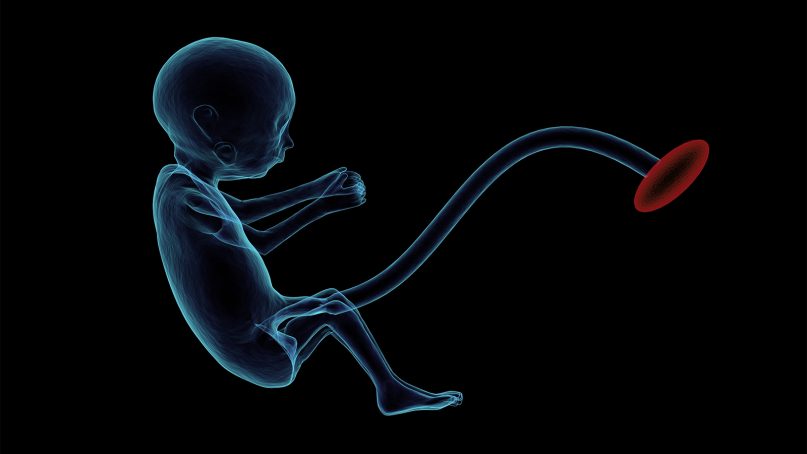(RNS) — The U.S. Conference of Catholic Bishops recently voted to create guidelines that might bar President Joe Biden, because of his support for a woman’s choice to end a pregnancy, from receiving the sacrament of Holy Communion.
Meanwhile, the U.S. Supreme Court agreed in May to hear a contest to a Mississippi law banning abortion after 15 weeks — one of a number of recent laws that run afoul of Roe v. Wade.
As soon as the high court announced its acceptance of the Mississippi case, the National Council of Jewish Women launched a campaign, “Rabbis for Reproductive Freedom,” that amassed over 1,000 rabbis and cantors who support an unfettered right to abortion.
“Jewish law is clear that life begins at birth, and not prior,” contends Rabbi Bonnie Sharfman, who was ordained by the Academy for Jewish Religion-Los Angeles, a “transdenominational” school that provides rabbis and cantors to any Jewish movement.
RELATED: Common ground on abortion is staring us right in the face
“Judaism not only permits abortion, but even requires it when life is at stake,” said Reform Rabbi Joshua R.S. Fixler.
U.S. Rep. Debbie Wasserman Schultz of Florida, who says she has “always served and looked at policy through a distinctly Jewish lens,” shared her take on “the Jewish tradition that I’ve always been taught,” that “existing life should take precedence over potential life, and a woman’s life and her pain should take precedence over a fetus.”
All of the commenters above are, in their denominational (or transdenominational) rabbinic or lay contexts, entitled to their takes. But there is, in fact, a long and clear record over centuries of Jewish religious law’s approach to the matter, which is not accurately reflected by their words.
Abortion in the vast majority of cases, in no uncertain terms, is forbidden by Halakha, or Jewish law. The Talmud, for example, permits the Sabbath to be violated — something only permitted in cases of saving a life — to save a fetus. Maimonides’ teaching in “The Laws of Murder and the Preservation of Life” permits abortion only if the life of the mother is endangered by the fetus, which then has the status of a “pursuer”: a person who mortally threatens another and who thus can be killed.
Judaism, in this sense, regards a fetus neither as a baby nor a tumor. It views it, entirely reasonably, as an entity with the potential to become a human being.
A fetus, unarguably, is not an organ of the one carrying it. It can have a different blood type, a different skin color, even, as it does roughly half the time, a different sex. The DNA in its cells is not that of the gestating person. That is not religion; it is science.
Now, there is no compelling reason, of course, why Halakha should be the determinant of American law. But neither is there any excuse for misrepresenting Judaism’s approach to promote a personal or political stance.
There are, to be sure, cases in which Halakha permits, and even prescribes, the ending of a pregnancy — essentially when the woman’s life is endangered by allowing the pregnancy to continue. If, for instance, a grave emotional toll would be taken by the furtherance of a pregnancy, Halakha might consider there to be a risk of the mother’s suicide, and abortion required. Secular law’s definition of a mortal risk might not encompass such a situation.
But those cases are not only rare but dependent entirely on Halakhic judgments, not on the “choice” of a person carrying a potential life in utero. In Halakhic responsa — responses to real-life questions and situations put to rabbinic scholars, spanning centuries — not one responsum on abortion considers it to be a simple choice that can be made at will.
Judaism, as it happens, is overwhelmingly about responsibilities, not “rights.” And one such responsibility is the protection, in most cases, of fetuses. There may be rare cases where those responsibilities are superseded by other concerns, but, put starkly, it is almost always Jewishly wrong to end even a potential life.
I would not favor any law that affords full personhood to a yet-unborn baby. Since there are cases, if rare ones, where a Jewish American who is observant of Jewish law would be required by Halakha to terminate a pregnancy, I would favor a religious exception in any abortion ban.
RELATED: There is more than one religious view on abortion – here’s what Jewish texts say
But to reduce the decision to end a pregnancy to a mere choice to be made by the one on whom a fetus is dependent is to utterly overlook the moral dimension — however one might conceive of it — of the decision.
Choices are things we do with regard to careers, politics and food. Ending a potential human life, in Judaism’s eyes and I would contend in anyone’s eyes, requires a weighing not only of the impact of a birth but responsibility, if not to a system of religious law, at least to a developing fetus.
And one choice that should never be made is to misrepresent Judaism’s documented and time-honored approach to something like abortion.
(Rabbi Avi Shafran is director of public affairs for Agudath Israel of America, a national Orthodox Jewish organization. He blogs at rabbishafran.com. The views expressed here do not necessarily reflect those of Religion News Service.)





